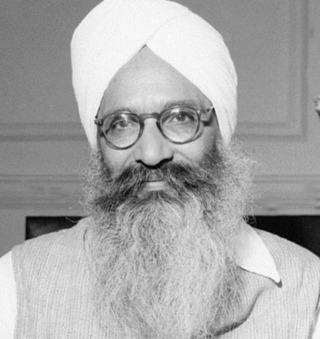Sarhali (Punjabi: ਸਰਹਾਲੀ) may refer to:
Sarhali (Punjabi: ਸਰਹਾਲੀ) may refer to:
Visual design elements and principles may refer to:

Anita Rani Nazran, better known as Anita Rani, is a British radio and television presenter.

Partap Singh Kairon was the 3rd Chief Minister of the Punjab province, and is widely acknowledged as the architect of post-Independence Punjab Province. Moreover, he was an Indian independence movement leader. He was jailed twice by the British Empire, once for five years for organizing protests against British rule. His political influence and views are still considered to dominate politics in Punjab.

Baba Gurdit Singh was the central figure in the Komagata Maru incident of 1914, one of several incidents in the history of early 20th century involving exclusion laws in both Canada and the United States designed to keep out immigrants of only Asian origin.
Feature article may refer to:

Rhett James McLaughlin and Charles Lincoln "Link" Neal III are an American comedy duo. Self-styled as "Internetainers", they are known for creating and hosting the YouTube series Good Mythical Morning. Their other notable projects include comedic songs and sketches, their IFC series Rhett & Link: Commercial Kings, their YouTube Premium series Rhett & Link's Buddy System, their podcast Ear Biscuits, their YouTube series Wonderhole, and their novel The Lost Causes of Bleak Creek.
Neutral point of view may refer to:
Dadehar Sahib is a village in Tarn Taran district in the Indian state of Punjab. It is located 30 km away from the Sikh holy city Amritsar and 18 km from Tarn Taran city.
Sarhali is a town and a municipal council in Patti subdivision of Tarn Taran district in the Indian state of Punjab.
Nathewal is a small village near the town of phagwara in the Jalandhar district in the Indian state of Punjab. The nearest villages include Rurkee, Ucha pind, Rurka Kalan, Sunner Khurd, Kahna Dhesian, Sarhali, Dhani Pind and Bundala.
LGBTQ literature may refer to:
Red link may refer to:
Mohanpura is a city in the Tarn Taran district of the Indian state of Punjab, located 40 km from Amritsar.

Naushehra Pannuan is a large village located in the Tarn Taran district in the Indian State of Punjab. The village is believed to be the largest village of the Pannu Jatt Sikh clan. Naushehra holds a prominent position in Punjab state politics with a number of state politicians vying for candidacy in the Naushehra Constituency each year.

Punjab 1984 is a 2014 Indian Punjabi language period drama film directed by Anurag Singh. It is based on the 1984–86 Punjab insurgency's impact on social life, notably it is a story of a mother and her missing son. Starring Diljit Dosanjh and Kirron Kher, the film is the fourth collaboration between director Singh and actor Dosanjh. Punjab 1984 released on 27 June 2014 to excellent box office collections.
Sirhali, also known as Sarhali, is a village in the Firozpur district of Punjab, India. It is located in the Zira tehsil.
Lakhanpal is a village in Jalandhar district of Punjab State, India. It is located 3.4 km away from postal head office in Sarhali, 14 km from Phagwara, 24.6 km from district headquarter Jalandhar and 142 km from state capital Chandigarh. The village is administrated by a sarpanch, who is an elected representative.
Cambridge Movement may refer to:

Google Family Link is a family parental controls service by Google that allows parents to adjust parameters for their children's devices. The application allows parents to restrict content, approve or disapprove apps, set screen times, and more. Google Family Link requires Google accounts in order to access the app remotely.

Gurudwara Sangat Tola is a Sikh temple in Dhaka, the capital of Bangladesh. It's located at no.14 Sishdas lane, Bangla Bazar in Dhaka.